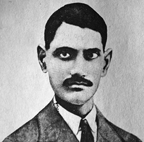Ghosh, Jogesh Chandra

Ghosh, Jogesh Chandra (1887-1971) educationist, ayurvedic specialist and entrepreneur, martyr intellectual. Jogesh Chandra Ghosh was born in 1887 at village Jalchhatra in Gosairhat upazila of Shariatpur district. His father was Purna Chandra Ghosh. Jogesh Chandra had his early education at his village school. He passed entrance examination in 1902 from Dhaka Jubilee High School, FA in 1904 from Jagannath College and got BSc degree from Kuch Bihar College in 1906. He obtained M.Sc degree in Chemistry from Calcutta University in 1908.
Jogesh Chandra Ghosh began his career as Professor of Chemistry in Bhagalpur College in 1908. Afterwards he joined Jagannath College as Professor of Chemistry (1912) to continue till 1947 when he was appointed as Principal of the College. He retired from service in 1948.
While a Professor in Jagannath College, Jogesh Chandra Ghosh had a pioneering venture in establishing a chemical laboratory in Dhaka for the manufacture of ayurvedic medicine. Established in 1914, this laboratory styled as Sadhana Aushadhalaya was the first of its kind in East Bengal, and had its glorious march for decades in promoting ayurvedic medicine. It was by his extensive research and practice that the aurvedic treatment and the method of manufacture of ayurvedic medicine attained perfection. Sadhana Aushadhalaya had its branches in different parts of the country and even beyond.
Jogesh Chandra Ghosh was a Fellow of Chemical Society (FCS) of London and Member of US Chemical Society (MCS). He wrote a number of books on causes of diseases, ayurvedic medicine and treatment, and on health science which include Agni-mandya O Kostha-baddhata, Arogyer Path, Griha-chikitsa, Charma O Sadharan Svasthya Bidhi, Chakshu-Karna-Nasika O Mukh-roag Chikitsa, Amara Kone Pathe, Ayurved Itihasa, Whither Bound are We, Home Treatment and the textbooks like Text Book of Organic Chemistry, Simple Geography, Simple Arithmetic.
Jogesh Chandra Ghosh, a pioneer in fostering aurvedic treatment in Bengal, dedicated almost six decades of his life to the service of the humanity. He was spontaneous in supporting any philanthropic work and was found patronising socio-cultural activities. During the 1964 communal riot in Dhaka, Jogesh Chandra Ghosh gave shelter and protection to the panic-stricken Hindu families of the neighbouring areas inside his factory building.
With the beginning of the war of liberation in 1971, the Pakistan army as a part of their genocide in Dhaka especially launched raid on the residence of the Hindus. All the Hindu service personnels of Sadhana Aushadhalaya left the factory to cross the border for safe refuge in India. Jogesh Ghosh alone remained at his huge establishment supported by only one attendant and two sentries. In the morning of 4 April 1971, a group of Pak army led by a member of the local Peace Committee entered the factory of Sadhana Aushadhalaya at 71 Dinanath Sen Road, Gandaria, Dhaka. On the plea of searching the office, four of them stepped upstairs along with Jogesh Chandra. He was alleged to have given shelter and support to the freedom fighters, and was shot dead at his chamber. Within a few hours the whole factory including other establishments of Sadhana Aushadhalaya was ransacked and the valuables were plundered.
The Postal Department of Bangladesh Government issued commemorative postal stamp in the name of Jogesh Chandra Ghosh on the Martyred Intellectual Day on 14 December 1991 in recognition of his contributions and sacrifice for the cause of the nation.
[Muazzam Hussain Khan]
